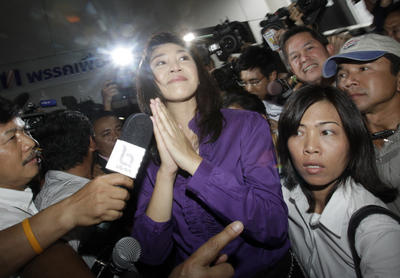But just over a year later, in December 2007, Thaksin’s allies stormed back to power with a re-branded political vehicle. Much to the astonishment of the coup-makers and their cheer squad among Bangkok’s middle class and elite, Thaksin, the most electorally successful politician in Thai history, still managed to draw the most votes.
Thaksin and his allies had endured military intervention, official sanctions and a persistent smear campaign. But by the end of 2007 they were back in power. With no immediate trigger for another coup, shadowy interests were then used in 2008 to unseat two prime ministers from Thaksin’s side. Those leaders were out-manoeuvred by a concert of royalist-military-judicial forces still unwilling to accept the verdict of the people.
Thaksin’s men were replaced by Prime Minister Abhisit Vejjajiva: a youthful, dashing, British-educated career politician from the Democrat Party — a party which has rarely done well in national polls. Abhisit has now been in power for over two years and has overseen two periods of punctuated political conflict.
First, he guided Thailand through the awkward days in April 2009 when, due to agitated Thaksin allies taking to the streets, he was forced to abruptly cancel the East Asia Summit. It was an ignominious start to his time as prime minister and signalled the intention of Thaksin-aligned Red Shirt activists to continue their provocation and disruption.
Then, in 2010, things got even more heated when a months-long protest in central Bangkok brought parts of the city to a standstill. Huge crowds of Red Shirts, sometimes in boisterous convoys, but also fortified in strategic locations across the city, sought to bring Abhisit’s government to its knees.
In April, and then again in May, their tactics were met by Thai army firepower. Images of snipers taking on unarmed civilians in central Bangkok made front pages around the world. Certain elements among the Red Shirts were better armed and sought to take the fight back to government forces. On the final day of that bloody crackdown some embraced spectacular acts of arson to vent their anger at the government’s heavy-handedness.
But then — after the burning and killing and grief — things went quiet. Abhisit’s government initiated a program of reconciliation and called for all Thais to discard their recent animosities. The government insisted that everyone forget about the bloodshed as they rounded up Red Shirt leaders for indeterminate periods of incarceration.
In its public pronouncements the Abhisit government asked Thais to commit themselves to the country’s unifying trinity of nation, religion and king.
And then they decided an election was worth a shot.
In the lead-up to today’s poll the emotions within Abhisit’s circle of advisors must have swung wildly.
When the date for the election was initially announced Abhisit and those around him appeared to expect a very strong showing at the polls. Seeking any chance to strengthen their mandate and disabuse their critics of the notion that the Democrat Party struggles to win popular support, they pulled the trigger at a time chosen to maximise their opportunity for success.
As the election campaign picked up speed, Yingluck Shinawatra, Thaksin’s sister, was introduced to the Thai people as the opposition’s prime ministerial candidate. Abhisit’s strategies started to look increasingly stale, and things have turned for the worse.
Some Democrat Party supporters must now be wondering whether an election in 2011 was such a good idea after all.
Their dreams of a dominant election performance unravelled as soon as Abhisit was forced to campaign. While appraisals of Yingluck’s performance vary, she seems to have generated far more buzz than anybody had initially anticipated. The novelty of being the first female candidate for the country’s top political office is one aspect. But Yingluck has also benefited from a consistent and professional campaigning strategy, and from her family resemblance to Thaksin. My colleague Andrew Walker has gone so far as to describe her as ‘Thaksin in a frock’.
To the horror of the Democrats, and if the opinion polls can be believed, it is Yingluck who now looks set to form the next Thai government.
Much will depend on the details of the electoral mathematics. Unless she manages to garner a big majority she will still need the support of minor parties to form a coalition. During any negotiations to create the next government there will be constant efforts to delegitimise Yingluck and to destabilise, right from day one, any coalition that she forms.
Nonetheless, Yingluck is now poised to shake up the Thai political order, and to challenge some of the impressions that Thai authorities have broadcasted since the coup against her brother in September 2006.
Today’s election is a referendum on everything that has happened over the past five years. It promises to be an important vote for the future of Thailand and one that will send a message about the country’s troubled record of respecting democratic mandates.
Dr Nicholas Farrelly works in the School of Regulation, Justice and Diplomacy in the Australian National University’s College of Asia and the Pacific. In June 2006 he co-founded New Mandala.


What about the equally violent crackdown of the yellow shirts in 2008 when Somchai Wongsawat, Thaksin’s brother in law, was a PM? What about vote-buying, the driver of the buzz around Pheu Thai Party’s rallies?
Subject matters aside, even the choice of words is enough to label this criticism as sensationalist and tabloid.
Nice followup analysis by Andrew Walker and Nicholas Farrelly at New Mandala
http://asiapacific.anu.edu.au/newmandala/2011/07/03/prime-minister-yingluck-shinawatra/